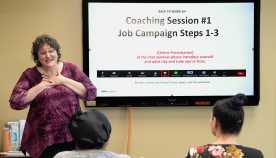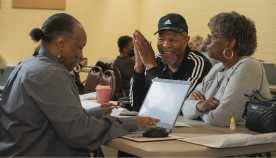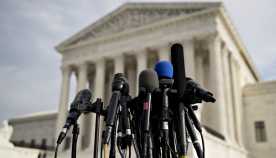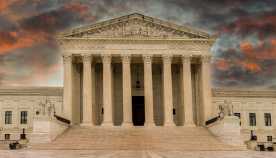About Us


In June 2025, the Supreme Court upheld a federal program that provides accessible and affordable telecommunications services to all people, including older adults living with low income and in rural areas.
Decision: FCC v. Consumers’ Research & Schools, Health & Libraries Broadband Coalition v. Consumers’ Research, 145 S. Ct. 2482 (2025)
In the Communications Act of 1934, Congress established the Federal Communications Commission (FCC) and charged it with providing reasonably priced and reliable communications services to all people residing in America. This mandate is known as “universal service.” The FCC initially executed its mandate through implicit subsidies and lowered costs for targeted consumers with its rate-regulation authority. 47 U.S.C. § 151. In 1996, after the breakup of the Bell System made implicit subsidies impractical, Congress amended the Act by adding § 254, which required carriers to contribute to the USF. 47 U.S.C. §§ 254(b)(3), (h)(1), (j). The amended universal service contribution scheme subsidizes telephone and high-speed internet services in schools, libraries, rural areas, and low-income communities.
Consumers’ Research challenged the constitutionality of the USF, arguing that the Supreme Court’s intelligible-principle test did not apply. FCC v. Consumers’ Rsch., 145 S. Ct. 2482 (2025). Under the intelligible-principle standard, a congressional delegation of authority to an executive agency is permissible if Congress has clearly stated “general policy” and established “boundaries of authority.” Gundy v. United States, 588 U.S. 128, 146 (2019). Consumers’ Research argued that universal service contributions are taxes, meaning that § 254 of the Act would be subject to a different non-delegation test where Congress must set a limit on the amount of money an agency can collect. Consumers’ Rsch., 145 S. Ct. at 2497–99. It argued that § 254 did not limit how much the FCC could collect from service providers, thus rendering it unconstitutional. Id. The U.S. Court of Appeals for the Fifth Circuit held that Congress’s sweeping delegation to the FCC in § 254 coupled with the FCC’s “subdelegation” to the Universal Service Administration Company (USAC) violated the non-delegation doctrine even if each delegation did not independently do so. Consumers’ Rsch. v. FCC, 109 F.4th 743, 778 (5th Cir. 2024).
Holding: The Supreme Court reversed the Fifth Circuit, holding that the universal service contribution scheme does not violate the non-delegation doctrine. Consumers’ Rsch., 145 S. Ct. at 2492. The Court rejected Consumers’ Research’s arguments that the USF operates as a tax and thus applied the customary intelligible-principle standard. Id. Under that test, the Court held that FCC did not step outside of the powers legitimately given to it by Congress in administering the USF or when it established the USAC to help administer the USF. Id. Specifically, the Court found that § 254’s “sufficiency” requirement provides meaningful policy guidance on universal service, and the statute’s requirement that the FCC only fund “essential, widely used, and affordable services for … designated recipients” establishes meaningful boundaries on the FCC’s authority. Id. at 2506. Because the statute listed the USF’s intended recipients, the programs they are to receive, and the conditions required to provide subsidies, the Court found § 254 met the intelligible-principle test. Id.
Rejecting Consumers’ Research’s argument that the FCC did not have to individually adhere to § 254’s criteria, the Court ruled that the statute places lawful boundaries on the FCC’s authority because, if read correctly, the criteria in § 254 are “separately mandatory”—that is, each requirement applies independently and the FCC does not have authority to pick and choose which requirements to prioritize. Id. The Court also found USAC’s role was permissible and did not violate the so-called private non-delegation principle because private entities are permitted to assist with a program’s administration. Id. at 2508.
AARP and AARP Foundation filed an amicus brief in support of the FCC and the constitutionality of the USF contribution scheme, arguing that the USF’s Lifeline program provides discounted broadband, internet, and voice services to eligible consumers with low income, including older Americans. Without Lifeline and other programs funded through the USF, older Americans would lose their internet access, worsening poverty and health outcomes due to digital isolation.
Implications
Because the Supreme Court found that the FCC’s universal service funding scheme did not violate the non-delegation doctrine, Lifeline and other programs will continue to provide discounted broadband internet services to older adults living in America. Broadband access provided by Lifeline helps one million older adults connect to the internet. This is especially important for older residents living in rural areas where telehealth services can be some of the only healthcare available. The Court’s decision is a victory for older adults who, like all of us, need internet access to engage with their communities and care for their own wellbeing.
- Sam Wehrle, SWehrle@aarp.org
- David Yellin, DYellin@aarp.org
View the Full Supreme Court Preview (PDF)





















